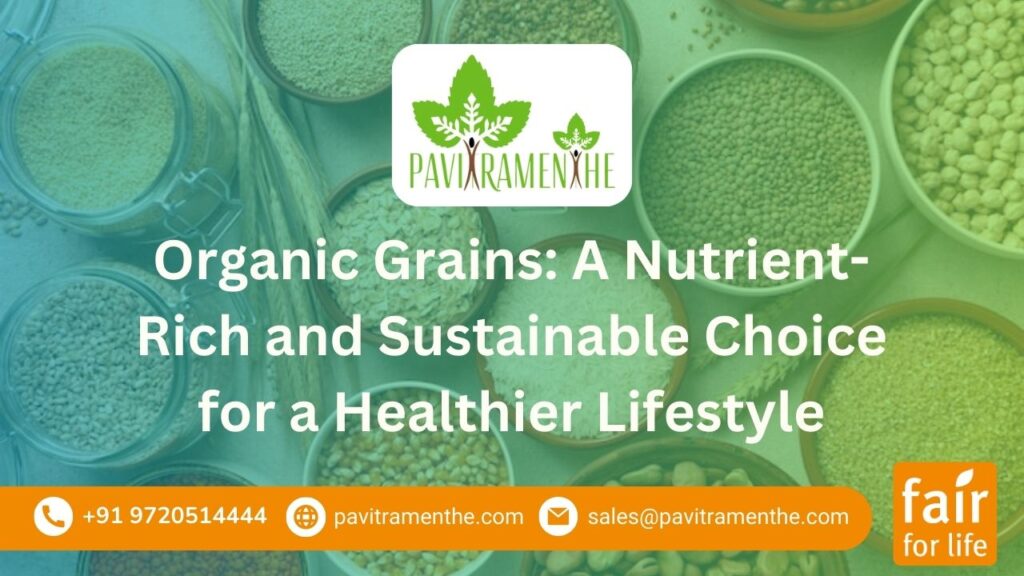Discover the natural goodness of organic grains and how they contribute to a healthier and more sustainable lifestyle. In this article, we delve into the numerous benefits of incorporating organic grains into your diet, exploring their nutritional value, environmental impact, and tips for making the switch.
Why choose organic grains?
These are cultivated using environmentally friendly practices that prioritize soil health, biodiversity, and the absence of synthetic chemicals.
1. Nutrient-Rich Goodness:
These are bursting with essential nutrients such as vitamins, minerals, and antioxidants. These nutrients are preserved due to the absence of synthetic fertilizers and pesticides, offering you a more wholesome and nourishing option.
2. Free from harmful chemicals:
Conventional grain farming often involves the use of pesticides and synthetic fertilizers, which can leave behind harmful residues. These are grown without these chemicals, reducing your exposure to potentially hazardous substances.
3. Environmental Sustainability:
Organic farming practices promote soil health and biodiversity, reducing soil erosion and preserving water quality. You’re supporting an agricultural approach that’s kinder to the planet.
4. GMO-Free:
These are not genetically modified organisms (GMOs) by nature. This means you’re consuming food in its natural, unaltered state, as Mother Nature intended.
Nutritional Highlights of Organic Grains:
Explore the nutritional powerhouse that organic grains are and how they can benefit your overall well-being.
1. Whole-Grain Goodness:
Organic whole grains retain their bran and germ layers, which are rich in fiber, B vitamins, and healthy fats. These elements contribute to improved digestion, heart health, and steady energy levels.
2. Abundant Fiber:
Fiber is essential for digestive health, weight management, and blood sugar regulation. It offers a higher fiber content compared to its conventional counterparts.
3. Heart-Healthy Nutrients:
It is a source of magnesium and potassium, minerals known for their role in maintaining a healthy heart rhythm and blood pressure.
4. Antioxidant Power:
It contains antioxidants that help combat inflammation and oxidative stress, reducing the risk of chronic diseases.


Tips for Incorporating Organic Grains:
1. Start Gradually:
Introduce it gradually into your diet to allow your taste buds to adjust. Mix organic and conventional grains to make the transition smoother.
2. Explore Variety: From quinoa and brown rice to oats and barley, the world of grains is diverse.
3. Read labels carefully:
When shopping for it, look for certified organic labels from reputable organizations.
4. Try Organic Baked Goods:
Explore the realm of organic baked goods made from organic flours. Bread, pasta, and pastries made from it can elevate your culinary experience.
Also Read: Oragnic mentha products
Environmental Benefits of Organic Grain Farming:
1. Soil Health:
Organic farming methods prioritize soil health through practices like crop rotation, cover cropping, and composting. This enriches the soil with organic matter, enhances its structure, and promotes beneficial microbial activity.
2. Biodiversity Conservation:
Organic farms often foster greater biodiversity by avoiding monoculture practices. This helps maintain a balanced ecosystem, supports pollinators, and reduces the need for chemical interventions.
3. Reduced Carbon Footprint:
Organic farming generally requires less energy-intensive inputs, such as synthetic fertilizers. By minimizing reliance on these inputs, organic grain farming can contribute to lower greenhouse gas emissions.
4. Water Conservation:
Organic practices emphasize water conservation through efficient irrigation techniques and soil moisture retention. This helps preserve water resources, especially in regions prone to drought.
5. Protecting Wildlife:
The absence of synthetic pesticides in organic farming is beneficial for wildlife and aquatic ecosystems. It prevents chemical runoff that can harm non-target species and disrupt food chains.
Making the Most of Organic Grains:
1. Hearty Breakfast Options:
Start your day with organic rolled oats topped with fresh fruits, nuts, and a drizzle of honey. You can also whip up a nutrient-packed quinoa or amaranth porridge.
2. Wholesome Lunches:
Enjoy organic brown rice or whole wheat pasta in nourishing salads. Experiment with adding organic farro to your soups for an extra dose of fiber and nutrients.
3. Nutrient-Dense Dinners:
Create satisfying grain bowls with a mix of it, lean proteins, and a variety of colorful vegetables. Use organic quinoa to stuff bell peppers or tomatoes for a flavorful dinner option.
4. Baking Adventures:
Replace conventional flours with organic whole wheat or spelt flour in your baking recipes. Try your hand at baking organic grain-based bread, muffins, and pancakes.
5. Snack Smart:
Snack on air-popped organic popcorn seasoned with your favorite herbs and spices. You can also prepare delicious energy bars using organic oats, nuts, and dried fruits.
Conclusion:
You’re not only investing in your health but also supporting a sustainable and eco-friendly food system. These grains offer a plethora of benefits, from improved nutrition to reduced environmental impact. Whether you’re savoring a warm bowl of organic oatmeal or indulging in a hearty quinoa salad, each bite is a step towards a healthier you and a healthier planet. Make the switch to it today and reap the rewards for years to come.

